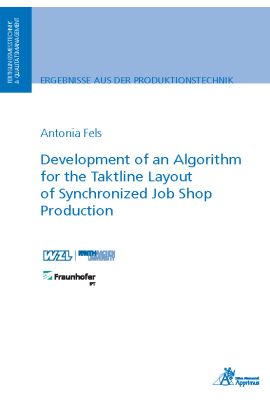Global economic trends in the recent decades can be summarized as shorter product life cycles, accompanied by an increasing demand for individualized products in many sectors, an emergence of competitors from low-wage countries and a technological convergence. Meeting the resulting market requirements such as great product variety and fast-paced innovations is essential in terms of a high customer orientation and competitiveness, yet often requires the reorganization of established production principles. In job shop production, e.g. tool manufacturing, the necessity for measures to enhance efficiency and robustness in production has evolved. As an effective measure, the change of the production principle towards the so-called synchronized job shop production has been shown. In synchronized job shop production, fundamental principles from serial production are realized, especially the lean and flow-based character is adopted. Potential for improvement in synchronized job shop production remains concerning the optimal layout of manufacturing facilities with regard to the material and product flow for further enhancing efficiency and robustness.
In this dissertation, an algorithm for the taktline layout in the context of synchronized job shop production is developed. Therefore, the concept of the algorithm is generated based on defined requirements, transferred into a mathematical formulation and subsequently implemented. The algorithm consists of two sequential discrete optimizations problems, namely a modified String Cover Problem and a partitioning Cluster Analysis Algorithm, including a Multiple Sequence Alignment. Target dimensions comprise especially of the mathematical optimum as well as the adaptivity of the algorithm for the reflection of company-specific preferences regarding the objective parameters throughput time, number and homogeneity of taktlines and logistic operations. The capabilities of the algorithm are verified theoretically. In addition, to ensure its industrial applicability and for an overall validation, use cases considering real-world data are conducted. To this end, historical production data from tool manufacturers are subject to the proposed algorithm.
| Autor | Fels, Antonia |
|---|---|
| Lieferzeit | 3-4 Tage |
| Gewicht | 0.306 kg |
| Erscheinungsdatum | 11.03.2019 |
Fertigungsmesstechnik und Qualitätsmanagement
Development of an Algorithm for the Taktline Layout of Synchronized Job Shop Production
Kurzbeschreibung
In job shop production the change towards synchronized job shop production, which is based on the concept of so-called taktlines, has been shown to enhance efficiency.
In this dissertation an algorithm for the taktline layout is developed, following a multi-objective approach. The algorithm consists of two sequential discrete optimizations problems, namely a modified Substring Cover Problem and a partitioning Cluster Analysis, including a Multiple Sequence Alignment. For an overall validation, real-world data from tool manufacturers are subject to the proposed algorithm.

